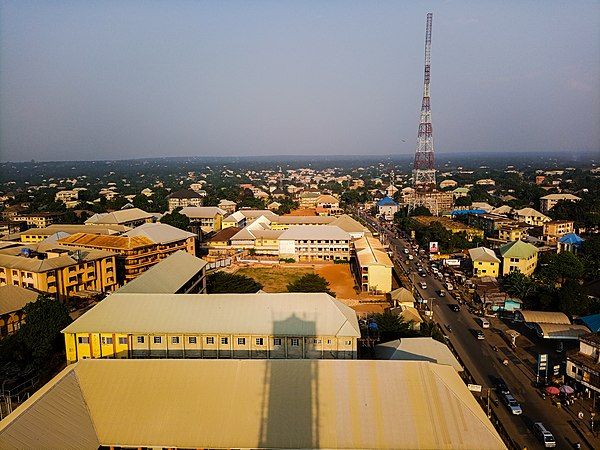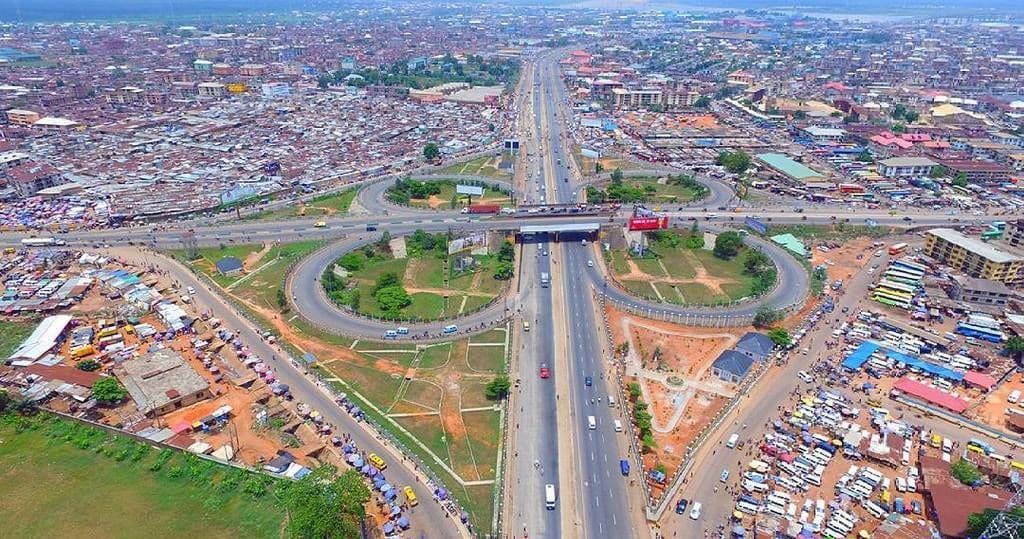Find More About Nnewi
Nnewi is a town in Anambra State, Nigeria. It is located about 15 miles south of Onitsha and has a population of about 958,000. Geographically, it falls within the tropical rainforest region of the world. And as such, it suffers from soil leaching and soil erosion. In spite of these factors, which have reduced the soil to a porous sandy terrain, her citizens have survived this harshness through subsistence type of agriculture and trading. Prior to this period, an elaborate network of trade routes emerged over the centuries linking them to the coastal region, the riverine Igbos, and the entire Igbo mainland (Oru na Igbo)
Before the British took over the administration of Nnewi in 1904, Nnewi as a kingdom had thrived for about four to five hundred years, according to oral tradition. It is believed that the kingdom was founded around the 15th century. Throughout her history, Nnewi employed its military might to maintain her borders and, at times to expand them if need be. Buffer zones were established for attacks. She accomplished these without a standing army. Based on the nature of the internal problem, mercenaries from Igboland were brought in to assist in army campaigns or carnage.
Edo is the supreme deity of all the deities in the Anaedo clans. The central shrine of this unifying deity is Nkwo Nnewi (central market). Nnewi, Ichi, and Oraifite are members of Anaedo. These communities have common ancestries with respect to their beliefs and their traditional value system. Afiaolu and Ikwuaru are traditional festivals celebrated by Christians and traditional religionists. Traditional Nnewi is divided into four quarters: Otolo, Uruagu, Umudim, and Nnewi-Ichi. Each quarter is further divided into villages and family units called Umunna. Each Umunna has a first family known as the obi.
His Royal Highness Igwe K. O. N. Orizu III is the first-class chief in Anambra state from Nnewi and was the chairman of the Anambra State House of Chiefs. Chief Nnamdi Obi, Chief Kenneth Okafor, and Chief George Onyekaba are the current obis of Uruagu, Umudim, and Nnewichi, respectively. These three Obis, with the Igwe Orizu III as chairman, constitute the Igwe-in-Council, and they deliberate on the spiritual, traditional, and communal matters in Nnewi.
For the past fifty years, Nnewi has embarked on various types of community development programs, which include building primary schools, post-primary schools, hospitals, rural electrification, and water supply projects. These infrastructures earned her urban status in the early 1970s. In terms of education, Nnewi has 48 elementary schools, six post-primary schools,15 hospitals, medical centers, and a teaching hospital—Nnamdi Azikiwe University.
In the Nigerian arena of politics, Nnewi has contributed her fair share. Dr. A.A. Nwafor Orizu was president of the Nigerian Senate and, later, the Acting President before the first coup d’etat of 1966; Chief Z.C. Obi, Onunekwuluigbo, President General of Ibo State Union 1951-1966; Chief Emeka Odumegwu Ojukwu, the Biafran leader; Mr. F. C. Nwokedi, the first Nigerian Permanent Secretary. Dr. Dozie Ikedife and Professor A. B. C. Nwosu were Commissioners in the East Central State and Anambra state, respectively. Dr. Sunny Okongwu was a Federal Minister of Finance in Babangida’s government. General Samuel Ifeanyichukwu Momah was a Federal Minister of Science and Technology. Senator Onyeabo Obi (Ose Oji Nnewi) was a Federal Senator, and Professor A B C Nwosu was also a Federal Minister of Health in the Obasanjo government. Apart from contributing her own share in terms of Nigerian Politics, Nnewi has created a vibrant economy since after the Civil War. In spite of the setback, during and after the Civil War, Nnewi has made a quantum leap with respect to economic development. Ajulu Uzodike (Ozi Uzo Nnewi) was the President.
Nkwo Nnewi Auto spare parts industry started during the Civil War. By the early 1980s, the manufacturing of autos, spare parts, and other goods was added to the economy. These industries have survived over the years due to the quality of their products. Their market shares have increased tremendously in recent years. Today, Nnewi accounts for over 23% of products in the Nigerian market with respect to motor vehicles and motorcycle spare parts.
The following are the names of the major manufacturing industries:
1. Ibeto Group of Companies
2. Cutix and ADswitch
3. Omata Holdings Ltd
4. Centro Group of Companies
5. Coscharis of Companies Group
6. Innoson Group of Companies
7. Edison Nig. Ltd
8. John White Industries
9. M. O. I. Ltd.
10. John Ray Industries LTD
11. Luis Carter Industries LTD
12. Iju Industries LTD, etc.
Transportation is very vital to the development of any commercial center. Nnewi ranks first among other towns in the aspect of economic development. She embarked on this before the Civil War. Best-known names in the transportation industry, past and present, are:
1. Ojukwu Transport
2. Orizu Transportation
3. D, D Onyemelukwe Transport
4. Ekene Dili Chukwu Nig. Ltd.
5. Chidi Ebere Nig. Ltd.
6. Ijeoma Motors Nig. Ltd.
7. Ekeson Motors Ltd.,
8. Izuchukwu Nig. Ltd.
9. Nsoedo Transport Ltd., etc
To support the aforementioned economic progress, Nnewi has, at present, six to seven modern hotels that are well-furnished with modern amenities. The most important ones are:
1. Anaedo Guest House
2. Beverly Hills Hotel
3. CONV-AJ Hotel
4. Hotel De Universe
5. King’s Palace
6. Regent
7. Sabena
8. Jideofo
9. Ofala Guest House, etc
Despite these major steps in the right direction, the Nnewi people are still striving to improve their community in terms of good roads, living quarters, and educational facilities. Nnewi organizations

Igwe Kenneth Onyeneke Orizu III
Igwe Kenneth Onyeneke Orizu III (born 1925) is the 20th Obi of Otolo and Igwe of Nnewi kingdom. He is the traditional supreme ruler and spiritual leader in Nnewi, an Igbo city in Nigeria. He is a member of the Nnofo Royal lineage and the successor to his father Igwe Josiah Orizu II, his grandfather Igwe Orizu I, and great-grandfather Igwe Iwuchukwu Ezeifekaibeya. Unlike most Igbo monarchies, there were kings of Nnewi before the arrival of Europeans. In Anambra State, Igwe Kenneth Orizu III is the vice chairman of the Anambra State House of Chiefs and as of 2015 the longest-serving monarch in Nigeria.
Igwe Kenneth was educated at Hope Waddell College, Calabar and completed his education at New Bethel College, Onitsha in 1942. Before his enthronement, Kenneth worked as a Representative of the then Eastern Nigerian Outlook Group of newspapers, in the defunct Eastern Region of Nigeria and later moved to Asaba as the Commercial Manager for Mid-Western Region.. He was also a businessman in Kano.
Reign
Igwe Orizu II was instrumental in the clearing of the Agbo Edo forest. His Uncle, Prince Nwafor Orizu was Nigeria's first republic senate President and his grandfather, Igwe Orizu I (Eze Ugbonyamba) was the first Igbo man to own and drive a car in the entire Eastern Region.[4] The Ofala Nnewi is a cultural festival held every year to celebrate the coronation of the Igwe of Nnewi.
Cultural Transformation
The King is the first of Nigerian Monarchs to abolish the Osu caste system, thus making everyone in the province of Nnewi free born. Kenneth also discouraged wastage of resources at traditional marriage and funeral ceremonies.
Social Advocacy
The King dealt with a political crisis in Nnewi by allowing the town in a general assembly to choose a title for him to restore peace in the town. Thereafter, the community named him the GENERAL OF PEACE. His other title is, Commander of the Order of the Niger (CON). The King is a one Star Paul Harris Fellow of Rotary International.
Education Sector
The King was instrumental in the establishment of a Teachers Training College in Nnewi; now Nnamdi Azikiwe University, Nnewi. He also advocated the siting of the College of Health Sciences of the University by encouraging Nnewi people to make significant financial contributions. He personally donated most of the land for the establishment of the school.
Business
The King facilitated the establishment of New Nnewi market and this market gave Nnewi prominence as one of the largest commercial cities in Nigeria.

Anambra State
Anambra State is known as the Home for All. The estimated population of the state is approximately 4 million people. The capital of the state is Awka. The major cities and towns in the state are Aguata, Awka, Ihiala, Nnewi, and Onitsha. The state was created on August 27, 1991, following the creation of state exercises in Nigeria. The state was created from the old Anambra State and derives its name from the Anambra River, which itself is a tributary of the majestic River Niger. Anambra State has two of the largest markets in Nigeria. The markets are the Onitsha Main Market, reputed to be the largest of its kind in the West African sub-region, and the Nnewi (Nkwo) Market which is said to be the largest automotive parts market in Nigeria. Few States in Nigeria have as many neighbors as Anambra State. The state shares boundaries with Abia State, Delta State, Enugu State, Imo State, and Kogi State.
Nigeria
Nigeria is located in Western Africa, bordering the Gulf of Guinea, between the countries of Benin and Cameroon. The country has a total land mass of 923,768 square kilometers, which comprises 13,000 square kilometers of water and 910,768 square kilometers of land. The climate varies from equatorial in the south of Nigeria to tropical in the center of the country and arid in northern Nigeria. Nigeria is by far the most populated of African countries. In 2003, Nigeria had an estimated population was 133,881,703, yielding an average density of 145 persons per sq km (375 per sq mi). The economy has been dominated by the production of petroleum, which lies in large reserves below the Niger Delta. Its many ethnic groups give the country a rich culture. Nigeria is composed of more than 250 ethnic groups.
The following are the most populous and politically influential: Hausa and Fulani 29%, Yoruba 21%, Igbo (Ibo) 18%, Ijaw 10%, Kanuri 4%, Ibibio 3.5%, Tiv 2.5%. The estimated age structure of Nigeria in 2002 was that 43.6% of the population (male 28,503,211, and female 28,156,976) was in the 0-14 (years) age bracket. The 15-64 (years) age bracket comprised 53.6% of the population (male 35,418,119, and female 34,179,802), and those that were 65 years and over comprised 2.8% of the population (male 1,832,682, and female 1,844,121)
The Literacy rate of the total population was projected to be 57.1% in 1995 and has since improved significantly. The oil sector of Nigeria provides 20% of the GDP, 95% of foreign exchange earnings, and about 65% of budgetary revenues. Nigeria is the fifth largest source of United States oil imports and one of the world’s largest oil exporters. Other industries in Nigeria include coal, tin, Columbia, palm oil, peanuts, cotton, rubber, wood, hides and skins, textiles, cement, food products, footwear, chemicals, fertilizer, ceramics, and steel.
